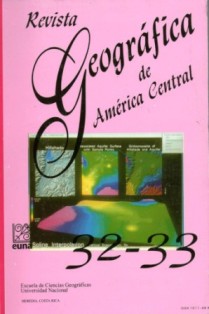USO DE SISTEMAS DE INFORMACION GEOGRAFICA PARA ANALIZAR IMPACTOS DE ACTIVIDADES HUMANAS SOBRE EL HABITAT POTENCIAL DEL VENADO COLA BLANCA (odocoileus virginianus), GUANACASTE, COSTA RICA.
Resumo
El presente trabajo se realizó en el distrito central del cantón de Bagaces, Guanacaste, Costa Rica y tiene como propósito evaluar el impacto de la II fase del proyecto de Riego Arenal-Tempisque en el hábitat potencial del venado cola blanca (odocoileus virginianus). Los resultados del estudio indican que la II etapa del Proyecto de Riego impactará 4.633 hectáreas del hábitat clasificado como alto para el venado.
SUMMARY
The aim of this paper is to discuss and illustrate the usefulness of the GIS in the evaluation of the impact of the II Phase of the Arenal-Tempisque irrigation project on the habitat of white-tailed deer. The study area is the central canton of Bagaces in Guanacaste, Costa Rica. Once fully developed, the irrigation project will impact 4633 hectares of prime deer habitat.
Downloads
Como Citar
Edição
Seção
Licença
Política proposta para revistas que oferecem Acesso Aberto
Os autores que publicam nesta revista concordam com os seguintes termos:
a. Os autores mantêm os direitos autorais e garantem à revista o direito de ser a primeira publicação do trabalho, sob a Licença Creative Commons https://creativecommons.org/licenses/by-nc-sa/4.0/deed.es, que permite que outros compartilhar com reconhecimento da autoria do trabalho e da publicação inicial nesta revista.
b. Os autores podem estabelecer separadamente acordos adicionais para a distribuição não exclusiva da versão do trabalho publicado na revista (por exemplo, colocá-la em repositório institucional ou publicá-la em livro), com reconhecimento de sua publicação inicial nesta revista. Esses acordos adicionais devem respeitar os termos da licença: ou seja: não envolver lucro e compartilhar com a mesma licença.
c. Os autores são incentivados a arquivar a versão/PDF pós-impressão ou do editor em repositórios de acesso aberto.






 REVGEO está licenciado sob https://creativecommons.org/licenses/by-nc-sa/4.0/deed.es
REVGEO está licenciado sob https://creativecommons.org/licenses/by-nc-sa/4.0/deed.es
.svg_4.png)

_(1).png)
_(1)_(1)_(1)_1.png)
(2)(1)(1)(1).png)
